Medieval metal is a subgenre of folk metal that blends heavy metal music with medieval folk music. Medieval metal is mostly restricted to Germany where it is known as Mittelalter-Metal or Mittelalter-Rock. The genre emerged from the middle of the 1990s with contributions from Subway to Sally, In Extremo and Schandmaul. The style is characterised by the prominent use of a wide variety of traditional folk and medieval instruments.
The Bach-Werke-Verzeichnis is a catalogue of compositions by Johann Sebastian Bach. It was first published in 1950, edited by Wolfgang Schmieder. The catalogue's second edition appeared in 1990. An abbreviated version of that second edition, known as BWV2a, was published in 1998.

In Extremo is a German Medieval metal band originating from Berlin. The band's musical style combines metal with Medieval traditional songs, blending the sound of the standard rock/metal instruments with historical instruments. Versions of well-known traditional/Medieval ballads make up the main part of their repertoire, but the band has written an increasing share of original material in recent years. Their own material is written in German, whilst the traditional songs and cover songs are in a variety of languages.
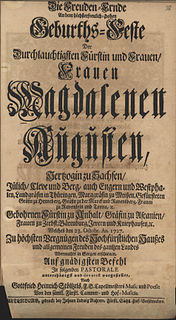
Gottfried Heinrich Stölzel was a prolific German composer of the Baroque era. Stölzel was an accomplished German stylist who wrote a good many of the poetic texts for his vocal works.
Herr Mannelig is a Swedish folk ballad that tells the story of a female mountain troll (bergatroll) who proposes marriage to a young human man. The troll is trying to convince "Sir Mannelig" to marry her. She offers him many great gifts but he refuses her.
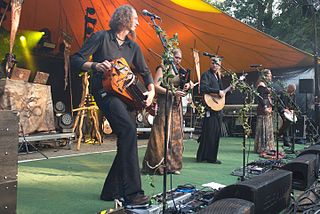
Faun is a German band that was formed in 1998 and plays pagan folk, darkwave, and medieval music. The originality of their music style is that it falls back to "old" instruments, and the singing is always the center of attention. The vocals are performed in a variety of languages, including German, English, Latin, Greek, and Scandinavian languages. Their instruments include Celtic harp, Swedish nyckelharpa, hurdy-gurdy, bagpipes, cittern, flutes, and many others.

Sünder ohne Zügel is the third folk metal album by the German band In Extremo. It was released in 2001 by Island Records.
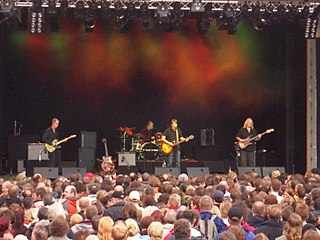
Element of Crime is a German rock band that plays melancholic chanson, pop and rock music with guitar, bass guitar, drums and voice/trumpet.
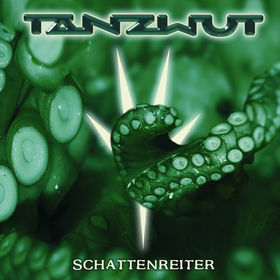
Schattenreiter is the fourth full-length studio album by the German industrial rock/medieval metal band Tanzwut. It was released on 7 April 2006 by PICA Music as a two-CD digipak. The album marks their newfound sound, which incorporates a more down-tuned use of guitars, darker atmospheres and harsher vocals at times than their previous albums, making them lean towards industrial metal.
Oni Wytars is an early music ensemble that was founded in 1983 by Marco Ambrosini and Peter Rabanser.

Ihr wolltet Spass is the third full-length studio album by the German industrial rock/medieval metal band Tanzwut. It was released in 2004 by PICA Music in a digipak. The album shows Tanzwut's sound gravitating towards a more industrial metal sound.

Labyrinth der Sinne is the second full-length studio album by German industrial rock/medieval metal band Tanzwut. It was released in 2000 by EMI Music.

Tanzwut is the first full-length studio album by the German industrial rock/medieval metal band Tanzwut. It was released on 1 March 1999 by EMI Music.

Weckt die Toten! is the debut album by the German folk metal band In Extremo. It was released on 1 May 1998 through Vielklang Musikproduktion.
The Symphony No. 8 "Lieder der Vergänglichkeit" by Krzysztof Penderecki is a choral symphony in twelve relatively short movements set to nineteenth and early twentieth-century German poems. The work was completed and premiered in 2005. The symphony has an approximate duration of 35 minutes. Penderecki revised the symphony in 2007 by adding a few more poem settings and the piece has expanded to around 50 minutes. It was the final symphony composed by Penderecki, before his death in March 2020.

Saltatio Mortis is a German medieval metal group. The Latin name means "dance of death". It is an allusion to the Danse Macabre, and a motto of the band is: "He who dances does not die."

Schandmaul is a German medieval folk rock band from the Munich area.
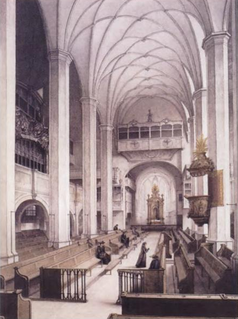
Johann Sebastian Bach composed the church cantata Was frag ich nach der WeltBWV 94 in Leipzig for the ninth Sunday after Trinity and first performed it on 6 August 1724. It is a chorale cantata, based on the hymn by Balthasar Kindermann (1664) on a melody by Ahasverus Fritsch.
Farzia Fallah is a composer. Since 2003 she has been living in Germany, and is currently based in Cologne.
"Nun liebe Seel, nun ist es Zeit", alternatively written "Nun, liebe Seel, nun ist es Zeit", is a Lutheran hymn for Epiphany, in five stanzas of six lines each, by Georg Weissel. It was first printed in 1642, set as a motet by Johannes Eccard. A version with an additional stanza is attributed to Johann Christoph Arnschwanger.













